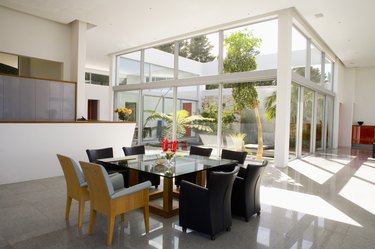Things You’ll Need
-
Guttering system
-
Gravel
-
Soil
-
Well system
-
Paint
-
Wooden shutters
-
Premade glass wall systems
-
Sliding doors
-
Premade glass roof system
-
Greenhouse faux glass/plastic
-
Wooden framework
-
HVAC duct work
-
Oil-filled portable radiator heaters
-
Plumbing materials
-
Electrical wiring
-
Hole saw
-
Decorative concrete blocks
-
Concrete tables
-
Plants
-
Concrete containers
-
Wooden lawn chairs
-
Wooden decking
-
Bamboo screens
 There are many unique ways to design an atrium. Image Credit: Goodshoot/Goodshoot/Getty Images
There are many unique ways to design an atrium. Image Credit: Goodshoot/Goodshoot/Getty Images
Building an atrium is an excellent way to enjoy natural light and an outdoor feeling with limited exposure to the elements. Constructing a small enclosure with four walls and glazing overhead will permit you to use the space in a variety of ways. You can treat the atrium as a sunroom, greenhouse, family room or foyer. While you can build an atrium surrounded by walls in the center of a house, it's possible to construct an atrium from one or two solid walls and additional glass.
Video of the Day
Step 1
Locate space within your home's layout for the atrium. Look for room between two house walls forming an L-shape and the exterior of a garage wall, for example. Design the atrium as an open space surrounded by walls with a glass roof or greenhouse-style roof made of tough plastic. Leave the atrium open on top, as another option, with no roof covering.
Step 2
Check the house foundation for any moisture issues. Ask an expert to assist if you will leave the atrium fully open to the elements with no roof at all. Install an appropriate guttering system to channel water away from the house foundation, for example. Install layers of gravel and soil for drainage or create a well system to catch the water, as other options.
Step 3
Finish all four atrium walls for visual appeal. Paint four sides of exterior house walls with pale green paint, for example, and install white wooden exterior shutters over all window surfaces facing into the atrium. Make your existing kitchen walk-out door the access door to the atrium, as one choice. Take out one or two exterior house walls and replace them with premade solid glass wall systems and a sliding door, as another option.
Step 4
Remove house guttering on overhangs, if you will cover the atrium with glass in some manner. Purchase a premade atrium roof system that is well-insulated. Construct a hard plastic roof from non-breakable greenhouse faux glass materials over a wooden framework as a less expensive choice. Don't use plastic, however, unless the atrium is for casual outdoor use with no heating or cooling used.
Step 5
Install some type of heating system for a atrium you will use as a foyer or living space. Channel heating and cooling via a ductwork system from your HVAC. Install one or two portable oil-filled radiator heaters that plug into 110-volt outlets as another choice. Choose a heating system based on how well atrium walls are insulated, taking into consideration that house exterior walls do typically have insulation.
Step 6
Route plumbing and electricity to the atrium. Build soffit spaces in the corner of the atrium, for example, as a good area to run water pipes for a sink. Run wiring or plumbing through house overhang areas as another choice. Cut space for pipes with a hole saw in rafters of the overhang. Check out house attic space to route wiring for light fixtures down through house exterior walls, as one solution.
Step 7
Take care of privacy issues if the atrium will serve as a sleeping area or guest area. Build a wall divider for a bed or study area using decorative concrete blocks on a concrete foundation, so no one inside other rooms can view the screened area of the atrium.
Step 8
Furnish the atrium appropriately. Add concrete tables with large plants in concrete containers and wooden lawn chairs, for example. Install a large bed on wooden decking behind bamboo screens. Add plants that will improve the ambiance, but do not overcrowd the atrium with plants, because moisture will form in the overhead glass areas and cause mold growth.







































